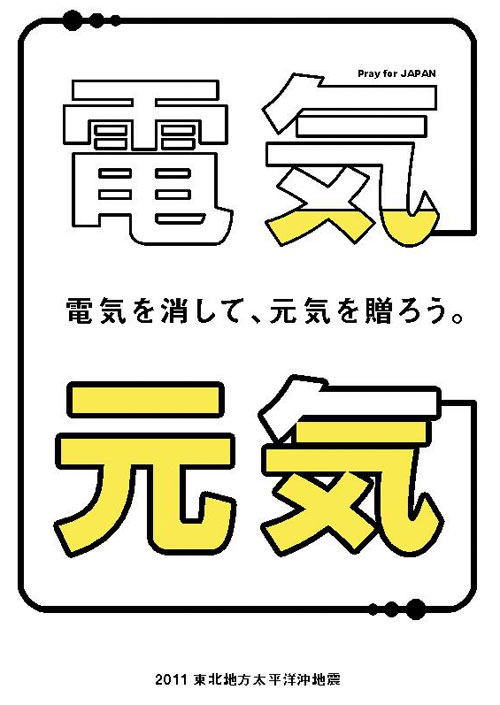Over on Facebook, my previous post generated a lot of ideas and suggestions. Thanks to everyone who chimed in; I was so pleased. I'd like to list them here, along with some expansion and additions I've been thinking of, too. One of the awesome posters from the Setsuden Poster collectionReplace old HVAC units
One of the awesome posters from the Setsuden Poster collectionReplace old HVAC unitsRoman said that his in-laws replaced their decade-old aircon units and saw big savings on their electric bills. This ecological efficiency also applies to any major appliance, like refrigerators (which are said to use about 20% of the household's electricity in the US), washing machines, or electric water heaters.
Adopt Daylight Savings TimeSoness told a funny story about trying to explain DST to a woman on the train. "
How will wives at home know what time their husband is coming home?" Getting this change through to people and lawmakers might be a difficult task. It's failed many times before. Greg senses this crisis be its best chance.
Reduce or eliminate climate controlThis idea came up over and over. Luke says he hasn't used aircon at home in 7 years. Jo wrote, "
At home, use the aircon to de-humidify the air
and chill the place right down, then switch it off and use fans for the
rest of the evening." There are lots of ways to be comfortable without icy-cold air conditioning.
Once a Week Natural AirIn the spirit of the "once a week
vegetarian" or "no car day" campaigns, encourage people to go without
climate control one day a week. Create a huge support campaign to offer
alternatives to using the air conditioning, show the benefits to
aircon-less days and so on. Make it fun, healthy, economical.
Promote new office fashions"Let's short pants!" For the past few summers CoolBiz has allowed salarimen to ditch the long sleeves and jackets as office cooling was reduced a few degrees, but what if we made "neat and casual" the new patriotic business norm? Linen trousers, "business shorts", seersucker suits, canvas shoes, short sleeves. With the right marketing, big sales at stores, and fashion features in magazines, this could be good for the energy crisis and for the economy as people update their wardrobes.
Establish shorter workdays
Some shops and malls are opening late and closing early to same energy.
Why can't offices do the same? Tod's company spends 200,000 yen/day on climate controlling their 5 or 6
floors. If they shortened the workday that would reduce costs and
electricity use in aircon, lights, computer power, and coffee machines.
Go outsideJo suggested, "
Spend and
entire day and night outside, and I swear you wont feel the heat so
badly afterwards; your internal body temperature will adjust to the
weather." She's an arechologist in Australia and knows about living in the heat. And when you are outside, you're not using very much power.
Enjoy al fresco life
A less extreme version of spending the night outdoors would be encouraging folks
to use their balconies, sit on stoops, play in the streets, walk outside
after dinner. Not only does this help reduce power use, but it is
healthy, builds community and stimulates the economy with purchases of new patio
furniture.
Gather for communal activitiesGetting people together for a meal is more efficient and more fun than everyone cooking alone. Home parties need to be on everyone's calendar. Maybe even big cooking sessions where everyone pitches in and then takes home a few meals' worth of food for the coming week. Another communal tradition, the public sento, would save tons of hot water.
Rotate restaurantsTokyo has the highest per capita of restaurants in the world and lots of them are struggling right now. Diners are spoiled for choice and as we are discovering about so many aspects of our lush urban life, really it is too much. What if restaurants got together (by neighborhood, maybe, or by class of restaurant) and organised a rota so each is open 4 days a week, instead of six or seven. They'd save energy, minimize overhead, and waste less food by concentrating their customers into a few good days rather than limping along with just a few tables a night. At the same time, citizen will be encouraged to eat out if they are not dining communally.
Minimise public sector daysRight now most museums are closed on Mondays. What if they opened only on weekends and Mondays, closing the other four days a week? This would create similar benefits as the revolving restaurant schedule and people would still have sufficient opportunity to view the exhibits. A similar closure schedule could be applied to certain government offices, too. Imagine if marriage offices closed on inauspicious days.





Recent Comments